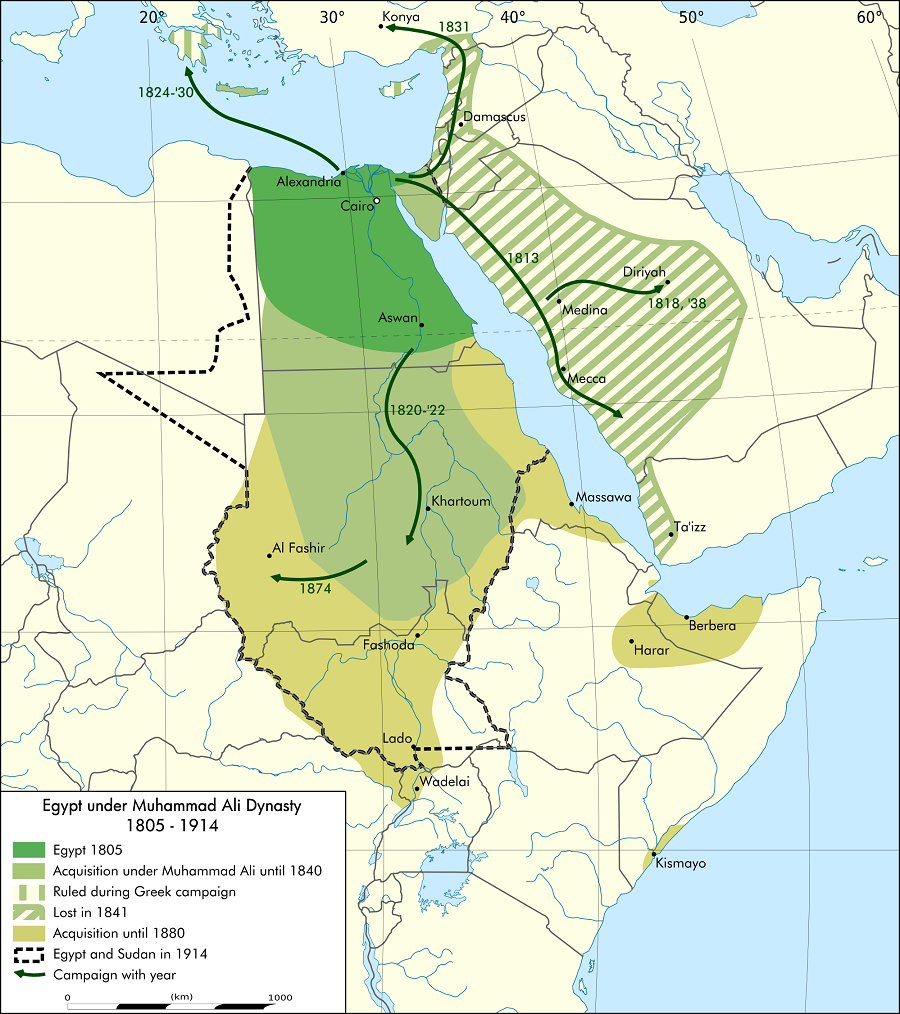The British army in twenty-five days had effected a debarkation at Ismailia, had traversed the desert, had occupied the capital of Egypt, and had fortunately defeated the enemy four times.”
Continuing Great Britain Expands Control of Egypt,
our selection from History of England by James Franck Bright published in 1893. The selection is presented in seven easy 5 minute installments. For works benefiting from the latest research see the “More information” section at the bottom of these pages.
Previously in Great Britain Expands Control of Egypt.

The conference, which met at the end of June, began by passing a self-denying protocol, in which the Powers pledged themselves to aim at no separate advantage by their joint action. Then, declaring that moral influence had failed, it requested the Sultan to supply the necessary force. He at once joined the conference, from which he had hitherto held aloof, and accepted the proposal. But the work of the conference was in fact nugatory; events had been too quick for it.
Arabi, who had collected his troops round Alexandria, had begun to erect fortifications there which threatened the British fleet. Again and again the Khedive, Dervis Pacha, and Admiral Seymour had warned him to desist. At length the Admiral’s patience was exhausted, and he proceeded (July 11th) to carry out his threat of bombardment. The other foreign ships, including those of France, having already left the harbor, the work fell exclusively upon the English. Though Arabi’s resistance was firmer than had been expected, the bombardment was successful and the batteries were silenced. The English sailors on landing found that the army had been withdrawn; but the Admiral, without troops, had no means of following up his success. Wild riot and destruction raged for several days; the loss of life and property was enormous. Order was at length restored. But, beyond the occupation of the city, which as a matter of course had resulted from the bombardment, no advantage appeared to have been gained; the army had not been defeated, it was still mutinous, and had to be reckoned with.
The policy of non-intervention, culminating in so violent an action as the bombardment of Alexandria, had no lack of bitter and indignant critics. It is in truth difficult to characterize as a policy action that appears to have depended so much on the events of the moment.
The first blow once struck, however, there was no hesitation. A vote of credit was obtained from Parliament (July 27th), a part of the reserves was called out, and troops were dispatched as speedily as possible, to what was evidently the scene of an approaching war. M. de Freycinet, the new French Minister, also demanded a vote of credit. But the opinion of France was strong against interference, the vote of credit was not passed, and M. de Freycinet resigned. The French Assembly by this action declared plainly its disinclination to take any further active share in the quarrel. In the hands of the English alone the campaign was carried out with unexpected success. The military organization, as reformed by Mr. Cardwell and ably managed by Mr. Childers, proved fairly efficient. Sir Garnet Wolseley was able to conduct his operations almost exactly in accordance with his carefully prearranged plan. With extreme secrecy, and after a feigned concentration in Abukir Bay, he brought his troops through Port Said and the Suez Canal to Ismailia, where he was joined by a contingent from India, bringing up his forces to about forty thousand men. Making the canal his base, he drew Arabi away from the more fertile and highly populated parts of the country, and, after a series of skirmishes with the object of securing the fresh-water canal, finally defeated him at Tel-el-Kebir, September 13, 1882. The blow was decisive and final. Troops were at once ordered in pursuit, Cairo was entered, and Arabi was taken prisoner. His army disbanded itself, and the soldiers wandered off to their homes. It had been a brilliant piece of work. In the words of Sir Garnet Wolseley’s dispatch, “the army in twenty-five days had effected a debarkation at Ismailia, had traversed the desert, had occupied the capital of Egypt, and had fortunately defeated the enemy four times.”
It was no longer a work of destruction that was needed, but a work of reconstitution. The defeat of the army at Tel-el-Kebir and the capture of Arabi had destroyed the only power capable for the moment of governing the country. The Khedive and his Ministry (the rightful representatives of the Government) were left powerless. It became a matter of urgent necessity that in some way or other order should be restored, and the lost powers of government replaced in the hands of their legitimate owners. It became a question whether England should undertake the work. In their own interest most of the European Powers desired that Egypt should be well governed, or at any rate solvent. They were willing enough that England, to whom, as they recognized, peace in Egypt was a matter of vital importance, should be at the expense and trouble of carrying out the work of reestablishment, which was, properly speaking, the duty of all the Powers. The destruction had been the work of English arms; it seemed only fitting that the labor of reconstruction should also fall to England. Yet the position was anomalous. It was by a sort of chance that the English Government had found themselves involved in a serious war. They had drifted into an armed intervention, driven by the force of circumstances and not by any will of their own. They had not acted as one of the members of the Dual Control in alliance with France. They had not acted as the mandatory of the general will of Europe. They could no longer declare themselves to be the agents of the European concert. Their help had not been asked for by the Khedive; on the contrary, the army crushed at Tel-el-Kebir had called itself the Khedive’s army.
It was necessary to clear up this anomalous position. One fact was plain —- Egypt was conquered. The natural alternative seemed to lie between a complete annexation of the conquered country and an open declaration of a protectorate. No Liberal government could contemplate such a step as annexation, nor would the popular feeling have allowed it. But the establishment of a protectorate seemed both an effective and a possible measure. No opposition was to be expected of a formidable character, except perhaps from France.
| <—Previous | Master List | Next—> |
More information here and here, and below.
|
We want to take this site to the next level but we need money to do that. Please contribute directly by signing up at https://www.patreon.com/history

Leave a Reply
You must be logged in to post a comment.